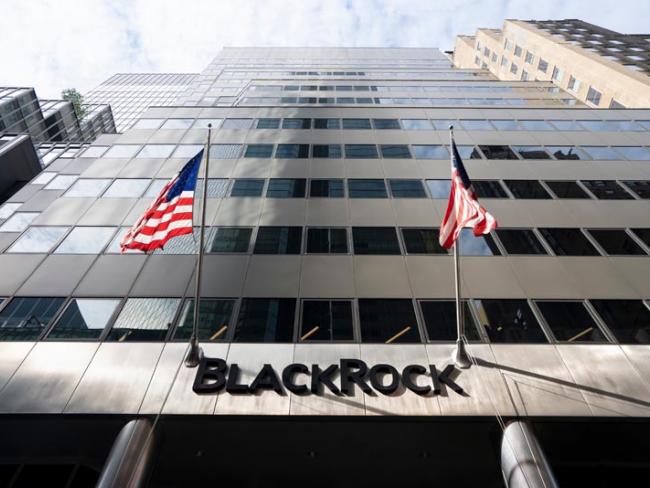
The New York headquarters of Blackrock, the world’s largest asset manager. Photo Tada Images/shutterstock.com.
Asset management companies live off the wealth created by others. They buy not to produce things of use, but to profit from squeezing the assets or selling them on…
Capitalism is mutating ever further from any productive role. Institutional investors, like pension schemes, insurance companies and sovereign wealth funds use asset management firms to manage an ever-larger share of their capital.
When an asset management firm like BlackRock owns, say, an energy enterprise, it contracts out all the operations. It is not an energy company. It invests in (that is, it buys) such companies solely with the aim of maximising income and extracting it. This is no more productive than a landlord renting out property, arguably less so.
By 2020, the global asset management sector was managing $103 trillion assets – over 40 per cent of the world’s total $250 trillion wealth. Asset managers charge huge fees for their services and have grown powerful in their own right, operating outside financial regulation.
These companies invest largely in two types of asset – housing of all kinds and infrastructure: energy, water, transport, telecoms, social goods like schools and hospitals, and farmland.
Exploitation
Asset managers now own global housing and infrastructure worth at least $4 trillion. They buy these assets not to run them, but to sell them on. The term “asset management” is a misnomer: these companies exploit and sweat assets – they manage them the way locusts manage crops.
In asset-manager society, a company like BlackRock not only owns your home, it also owns the land from which your food comes, the wind farm that generates your electricity, the road you drive on to work, and much else besides.
In Britain, by the early 1990s, almost all the previously state-owned infrastructure that could be sold off had been. Once privately owned, these assets could be bought by asset managers.
Introduced by the Conservative government in 1992, Britain’s Private Finance Initiative (PFI) really took off under Labour from 1997. It enabled private companies to make huge profits from creating assets which the public sector could have created far more cheaply.
This enabled Chancellor Gordon Brown to “massage” reported levels of public debt: the future government payments to the contractors did not appear on the government’s balance sheet. These assets too could then be bought by asset managers.
Does it matter who owns an enterprise? Yes: whether the government, a company or an asset manager owns it will affect service, investment, and prices. When finance capital gets its hooks into juicy meat, people suffer.
‘Does it matter who owns an enterprise? Yes. When finance capital gets its hooks into juicy meat, people suffer…’
The Financial Times chief economics commentator Martin Wolf called Britain’s privatised utility model “broken”, because private owners’ monopoly power was “an obstacle to investment”. Cosseted by monopoly conditions, owners bleed their infrastructure assets rather than invest to improve them. And asset managers invested the least.
A prime example is the water industry. In 2013, its regulator Ofwat challenged Thames Water’s proposed 8 per cent rise in customer rates, charging that the company had “underinvested on sewer flooding and on sewer treatment, and failed to adequately maintain some of its wastewater network.”
The Environment Agency prosecuted the company for pouring untreated sewage into the Thames and other rivers, and it was fined £20 million. The judge criticised the company for “inadequate investment, diabolical maintenance and poor management.”
In 2016-17, when the company utterly failed to reach its leakage reduction targets, it paid out £239 million in dividends. The Australian asset management firm, Macquarie, its then owner, made between 15.5 and 19 per cent a year from its investment in Thames Water, twice the norm.
Saddling companies with ongoing interest payments suppresses the companies’ taxable profits. So when Macquarie added £2 billion in debt to Thames Water’s balance sheet, it paid almost no UK corporation tax for a decade.
Relentless
Asset manager firms are relentless in squeezing maximum profits out of all the assets they own. A 2021 study of 1,674 care homes in the USA found that those owned by asset managers billed 11 per cent more for each stay. And they spent far less on patient care with predictable results.
Going to a care home owned by an asset manager increased the probability of death (compared to other for-profit homes in general) by about 10 per cent for short-stay Medicare patients. So, asset manager ownership of care homes meant that over 20,000 US lives were lost between 2004 and 2016.
Asset managers of this type are an extreme form of private equity management, often specialising in leveraged buyouts funded by debts. Nothing is safe from these pirates. For example they are now fleecing Britain’s £2 billion veterinary services sector.
Ten years ago, almost 90 per cent of Britain’s vets were independent. By 2021, just 45 per cent were, and six companies owned over half our veterinary practices.
The price of veterinary and other pet care services, such as kennel boarding fees, rose by more than twice the rate of inflation between 2015 and 2020. Pet owners face four-figure vets’ bills for a pet’s overnight stay in a clinic, and a single MRI scan can cost £2,500.
Asset-manager capitalism has little to do with production or service. It operates to put speculative profit over all else. Concerns about affordable access to a wide range of socially indispensable physical assets are irrelevant to them. Britain cannot afford to support them.
